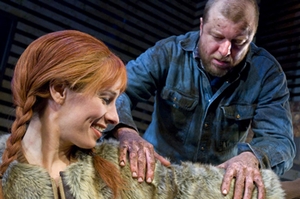The National Art Centre’s production of Sam Shepard’s loopy nightmare, Buried Child at the Leanor and Alvin Segal Theatre was a thriller that walked a tightrope between the real and the surreal.
 It’s a black comedy about an Illinois farm family in a state of ruin because of a skeleton in the closet. The play is a metaphor for home and family, and touches the mystic bond of family ties. But it is rooted in the notion that we live and grow with parents and siblings we often never really know. Or as Dodge, (David Fox) the bellicose patriarch of this monster family puts it: “Just because people propagate, doesn’t mean they have to love their offspring.”
It’s a black comedy about an Illinois farm family in a state of ruin because of a skeleton in the closet. The play is a metaphor for home and family, and touches the mystic bond of family ties. But it is rooted in the notion that we live and grow with parents and siblings we often never really know. Or as Dodge, (David Fox) the bellicose patriarch of this monster family puts it: “Just because people propagate, doesn’t mean they have to love their offspring.”
His wife, Halie, (Claire Coulter), a decrepit matriarch with secrets of her own, begins the play with an offstage conversation that suggests that while this is a couple who speak the same language, they really aren’t listening to one another.
Their eldest son, Tilden (Randy Hughson) is a dim-witted simpleton who tosses corn and carrots around to great effect. He’s back in the nest with his parents because of something bad that happened to him in New Mexico.
His younger brother, Bradley (Alex Ivanovici) is a sinister bully who hobbles around on a prostheses because his leg has been ripped off by a chain saw. It goes without saying, there is no lost love between the two siblings.
Add to the mix Dodge’s prodigal grandson, -Tilden’s son - Vince (Christie Watson) who hasn’t been around the farm for seven years. He unexpectedly drops in hoping to introduce his wholesome red-headed girlfriend, Shelly (Adrienne Gould), to the family.
But no one in the family seems to know who Vince is, and much of the second act is pre-occupied with his search for acceptance and identity.
The cast is as close to perfect as you can get, and Peter Hinton’s direction is hypnotically flawless.
David Fox was down and dirty as the cantankerous Dodge, Claire Coulter comically shrill and stunning as his wife, and Randy Hughson and Alex Ivanovici hypnotically spellbinding as their spooky sons.
Christie Watson was especially good as the befuddled Vince in the second act, and Adrienne Gould very convincing as the unsuspecting, level-headed girlfriend who would be better off not knowing anything.
John Koensgen made the most of a small but telling role as Father Dewes, a visiting clergyman.
Ed Sharpe’s simple slatted set of a living room with steps to an off- stage upstairs bedroom was bright and antiseptic when it should have been claustrophobic.
The sinister atmosphere wa, however, underscored by the punctuation of Robert Thomson’s lighting and Troy Slocum’s sound.
Like most avante garde theatre, Buried Child isn’t always easily accessible. Shepard’s willfully obscure, 1979 Pulitzer Prize winning script, fashion’s weird poetry out of dysfunctional families and human relationships.
![NAC_buriedchild_0463[1].jpg](/img/cache/articles/462/300x500_NAC_buriedchild_0463[1].jpg) The brilliant dialogue means pretty much what you want it to mean. Vince’s telling speech about seeing his face dissolve into those of his father and grandfather is about as close as you can get to the meaning of the play: “Like a mummy’s face I saw him dead and alive at the same time. His father’s face changed to his grandfather’s face, and it went on like that, changing, clear on back to faces I’d never seen before. Then everything dissolved.” In the final scene, as Vince claims his inheritance, his grandfather’s dilapidated farmhouse, his red cap, and couch, the cycle is about to repeat itself. Or is it?
The brilliant dialogue means pretty much what you want it to mean. Vince’s telling speech about seeing his face dissolve into those of his father and grandfather is about as close as you can get to the meaning of the play: “Like a mummy’s face I saw him dead and alive at the same time. His father’s face changed to his grandfather’s face, and it went on like that, changing, clear on back to faces I’d never seen before. Then everything dissolved.” In the final scene, as Vince claims his inheritance, his grandfather’s dilapidated farmhouse, his red cap, and couch, the cycle is about to repeat itself. Or is it?
Buried Child was the third in the Segal Centre’s happily themed season of plays about unhappy families - and so far, by far, the best.

























Comments
Please login to post comments.